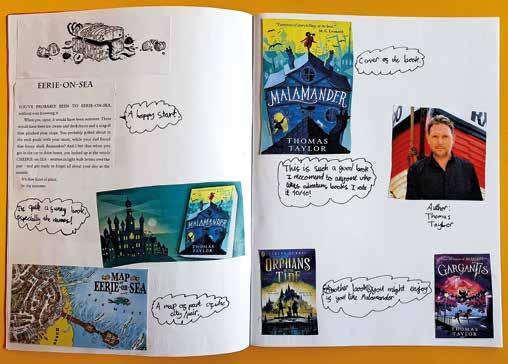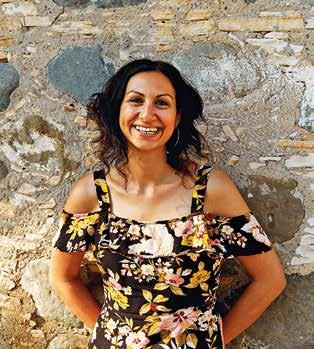
6 minute read
Jon Biddle & reviews
Jon Biddle, English lead and NEU rep at Moorlands Primary in Norfolk, is passionate about fostering a love of reading for pleasure. Here he shares ideas and tips for schools to try.
The power of books in developing empathy
PUPILS currently have to cope with a wide range of external issues, some of which have undoubtedly been caused by the ongoing Covid crisis and some of which are now a regular feature of modern life.
These pressures often lead to them feeling overwhelmed and can create problems around mental health. A greater focus on the importance of empathy in education would go a long way to addressing this.
The fifth national Empathy Day, organised by EmpathyLab, took place in June in schools and libraries across the UK. It was a huge success, featuring sessions from authors including Michael Rosen, Kwame Alexander, Malorie Blackman and Cressida Cowell.
As one of EmpathyLab’s pioneer schools, we’ve done a lot of work on developing empathy skills with our pupils and staff. We follow the simple model of focusing on Reading for Pleasure across the school, which directly leads to improved empathy skills, and then to increased social action.
Previously, we’ve based work around books on refugees, inter-generational relationships and homelessness. This year, we focussed on family members and understanding the emotions they might be experiencing. We explored a range of texts, including picturebooks such as Ruby’s Worry by Tom Percival and Felix After the Rain by Dunja Jogan, as well as longer books including A Kind of Spark by Elle McNicoll (a must-read).
We then discussed how these stories could relate to our lives at home and shared suggestions for ways to support family members. These ranged from simply asking ‘How was your day?’ to phoning absent relatives for a catch-up or offering to take on more responsibilities. Children realised they had the power to actually change the way somebody was feeling.
Many pupils wanted to read more books that dealt with empathy in families. We thought carefully about the books selected for our daily storytime sessions and ensured that there was at least some element of social action in them, something that the children could apply to their own lives.
Our focus on learning to see events from different points of view has also had a positive impact on classroom discussions about reading. Children are increasingly willing to justify their book recommendations to each other with comments about the characters and their feelings rather than just about the plot.
Our key stage 2 classes have created empathy-related reading scrapbooks, based on the inspiring work of Rob Crossley and Ceridwen Eccles on Twitter (#lovereadingscrapbooks). The children select a book that they feel includes a strong empathy angle, take it home and produce a scrapbook page about it, independently or with a family member. This encourages conversations about empathy and feelings and provides a good opportunity for them to talk about books with their parents, as well as being a valuable classroom resource when other children need ideas about what to read next.
(Above) An empathy scrapbook (Below) Reading The Life of Stephen Lawrence moved pupils deeply
Letters to Doreen Lawrence
Read more ideas from Jon next issue
As our work on Reading for Pleasure and empathy has become more embedded in our school over time, pupils have become more confident when speaking out and will challenge things that they perceive to be wrong. A couple of hours before writing this article, one of our classes read The Life of Stephen Lawrence by Verna Allette Wilkins. They were so moved by his story that they decided as a class to write a letter to his mother, Doreen, telling her how much they admired her courage and resilience.
We know that reading and talking about stories have the power to change the way people think and act, which is another compelling reason for making them an integral part of the school day.
n Visit empathylab.uk @EmpathyLabUK
@jonnybid
Let us know if you’d like to review them – email us at educate@neu.org.uk
Ripe Figs
FOOD writer and human rights campaigner Yasmin Khan returns to our kitchen shelves with her third book filled with enticing recipes and tales from the Eastern Mediterranean.
The beautiful cover and inside design immediately evoke the region, and the pages are well presented with large pictures. Each recipe is prefaced by a short story about its origins or how Yasmin came across it on her travels.
This book transports us to Greece, Turkey and Cyprus, countries which five million refugees have travelled through in the last half decade alone – the biggest movement of people Europe has seen since the Second World War.
Cultural exchange via food
Yasmin’s introduction explains that while this is of course a book about food, it is also about ‘the resilience of the human spirit’ and is dedicated to migrants everywhere. As we travel alongside her, she reminds us that one of the key benefits of migration is how cultural exchange expresses itself in the contents of our food cupboards.
Greek and Turkish favourites like cheese and spinach pies, kebabs and moussaka are featured. But this colourful and easy-to-follow cookbook also brings us lesser known dishes such as Afghan spiced pumpkin, pomegranate and sumac chicken, and zesty mackerel sandwiches, as well as tempting desserts like Cypriot frosted citrus cake.
Halloumi saganaki – a quick-to-make dish with ripe figs and added honey – is a definite winner.
Holding on to the food of your homeland, as Yasmin says, is often one of the most powerful ways to carry your identity when faced with displacement, conflict and war. Her first two books on Iranian and Palestinian cooking were bestsellers and this delightful and thought-provoking volume will undoubtedly follow suit.

(Above) Ripe Figs, the latest book by food writer Yasmin Khan. Educate has three signed copies to give away – see page 47 for more details
(Left) Author and campaigner Yasmin PHOTO by Matt Russell
Nadia Idle Ripe Figs by Yasmin Khan. Bloomsbury. £26. n Turn to page 47 for a recipe from Ripe Figs.
Live Well, Learn Well
WRITTEN by an experienced head of English who takes an active role in improving the wellbeing of teachers and students across the country, Live Well, Learn Well offers easy-toimplement techniques. Abigail Mann uses classroom management and layout, rewards and praise to support student wellbeing, and highlights the important role of wellbeing in developing highachieving learners. The book is full of practical ideas and activities that will encourage students to have a more positive outlook and is an accessible read for busy teachers. Highly recommended.
Aliss Langridge Live Well, Learn Well: A practical approach to supporting student wellbeing by Abigail Mann. Bloomsbury. £15.99.
Accidental Rich Boy
TEENAGER Nadim lives in a London tower block. When his father dies, the family is plunged into poverty. Nadim’s older brother is in prison so the pressure is on Nadim to save his mother and siblings from destitution. One day Nadim has an opportunity to break the cycle of poverty, but faces a moral dilemma that could have devastating results. This is a realistic, gritty novel tackling themes of poverty, loss, mental health, prison, gangs and keeping faith during challenging times.
A gripping debut novel for teenagers.
Cindy Shanks Accidental Rich Boy by Akmal Ullah. Beacon Books. £9.95.










